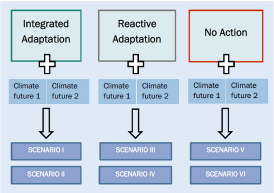
Climate adaptation scenarios
Climate impact hypotheses were translated into quantitative relationships and data layers for use in the InVEST ecosystem service models. Adaptation strategies were selected based on outcomes for ecosystem service provisioning with a set of four climate adaptation scenarios tested. In selecting the most appropriate adaptation strategies, we drew on existing research with stakeholders in Belize that identified the ‘best options’ for sustainable development, adaptation, and mitigation of climate change in Belize, and looked at these under three management scenarios.
• Existing strategies from climate development-partner funded efforts were the basis for discussion. The strategies had a focus on linkages between climate adaptation, mitigation and sustainable development (triple-wins) in the coastal zone.
• Literature review and focus group discussions were used to refine the list of strategies, to identify measures that are: feasible for Placencia to undertake; to map and value; and clearly responsive to climate impacts.
In some cases, there were insufficient data or understanding of the nature of the relationships between the climate change variable and ecosystem service to model robustly. As a result, we were only able to model climate impacts for two out of the four service models: lobster fishery and coastal protection.
Limited time and human capacity restricted our ability to model sea level rise impacts on coastline retreat at a fine scale (e.g. more precise modeling of mangrove distribution and land loss needs finer resolution bathymetry data). The resolution of existing bathymetry data for Belize is quite poor, as it is for much of the region, and the limited timeframe of this work (10 months) precluded the pre-processing of bathymetry data.
We got spatial results about changes in ecosystem services from climate change and development factors but we could not identify particular groups most vulnerable to these changes due to data gaps.

